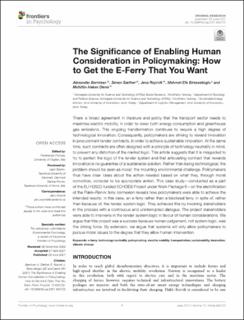| dc.contributor.author | Berntsen, Alexander | |
| dc.contributor.author | Sæther, Simen Rostad | |
| dc.contributor.author | Røyrvik, Jens Olgard Dalseth | |
| dc.contributor.author | Biresselioglu, Mehmet Efe | |
| dc.contributor.author | Demir, Muhittin Hakan | |
| dc.date.accessioned | 2021-10-20T12:00:11Z | |
| dc.date.available | 2021-10-20T12:00:11Z | |
| dc.date.created | 2021-06-29T14:20:36Z | |
| dc.date.issued | 2021 | |
| dc.identifier.issn | 1664-1078 | |
| dc.identifier.uri | https://hdl.handle.net/11250/2824132 | |
| dc.description.abstract | There is broad agreement in literature and policy that the transport sector needs to maximise electric mobility, in order to lower both energy consumption and greenhouse gas emissions. This ongoing transformation continues to require a high degree of technological innovation. Consequently, policymakers are striving to reward innovation in procurement tender contracts, in order to achieve sustainable innovation. At the same time, such contracts are often designed with a principle of technology neutrality in mind, to prevent any distortion of the market logic. This article suggests that it is misguided to try to perfect the logic of the tender system and that articulating contract that rewards innovation is no guarantee of a sustainable solution. Rather than being technological, the problem should be seen as moral: the mounting environmental challenge. Policymakers thus have clear ideas about the action needed based on what they, through moral conviction, consider to be appropriate action. This case study—conducted as a part of the EU H2020-funded ECHOES Project under Work Package 6—on the electrification of the Flakk–Rørvik ferry connexion reveals how policymakers were able to achieve the intended results: in this case, an e-ferry rather than a biodiesel ferry, in spite of, rather than because of, the tender system logic. They achieved this by involving stakeholders in the process with a continuous and uninterrupted dialogue. The project stakeholders were able to intervene in the tender system logic in favour of human considerations. We argue that this project was a success because human judgement, not system logic, was the driving force. By extension, we argue that systems will only allow policymakers to pursue moral issues to the degree that they allow human intervention. | en_US |
| dc.language.iso | eng | en_US |
| dc.publisher | Frontiers | en_US |
| dc.relation.uri | https://www.frontiersin.org/articles/10.3389/fpsyg.2021.635722/ | |
| dc.rights | Navngivelse 4.0 Internasjonal | * |
| dc.rights.uri | http://creativecommons.org/licenses/by/4.0/deed.no | * |
| dc.subject | Teknologinøytralitet | en_US |
| dc.subject | Technology neutrality | en_US |
| dc.subject | Elektrisk mobilitet | en_US |
| dc.subject | Electric mobility | en_US |
| dc.subject | E-ferge | en_US |
| dc.subject | E-ferry | en_US |
| dc.subject | Politikkutforming | en_US |
| dc.subject | Policymaking | en_US |
| dc.title | The Significance of Enabling Human Consideration in Policymaking: How to Get the E-Ferry That You Want | en_US |
| dc.type | Peer reviewed | en_US |
| dc.type | Journal article | en_US |
| dc.description.version | publishedVersion | en_US |
| dc.subject.nsi | VDP::Andre psykologiske fag: 279 | en_US |
| dc.subject.nsi | VDP::Other subjects within psychology: 279 | en_US |
| dc.source.journal | Frontiers in Psychology | en_US |
| dc.identifier.doi | 10.3389/fpsyg.2021.635722 | |
| dc.identifier.cristin | 1919343 | |
| dc.relation.project | EC/H2020/727470 | en_US |
| cristin.ispublished | true | |
| cristin.fulltext | original | |
| cristin.qualitycode | 1 | |

